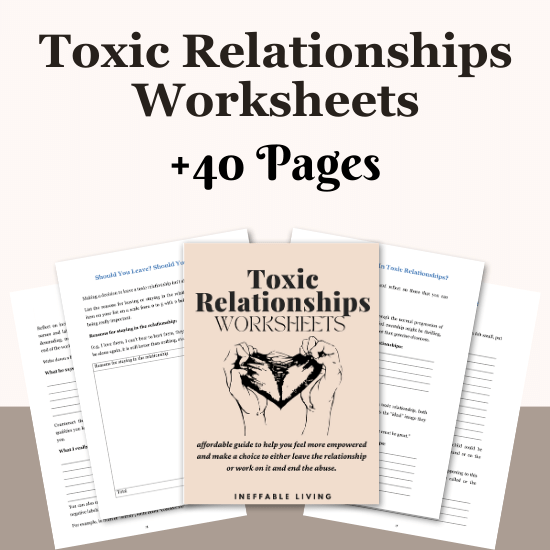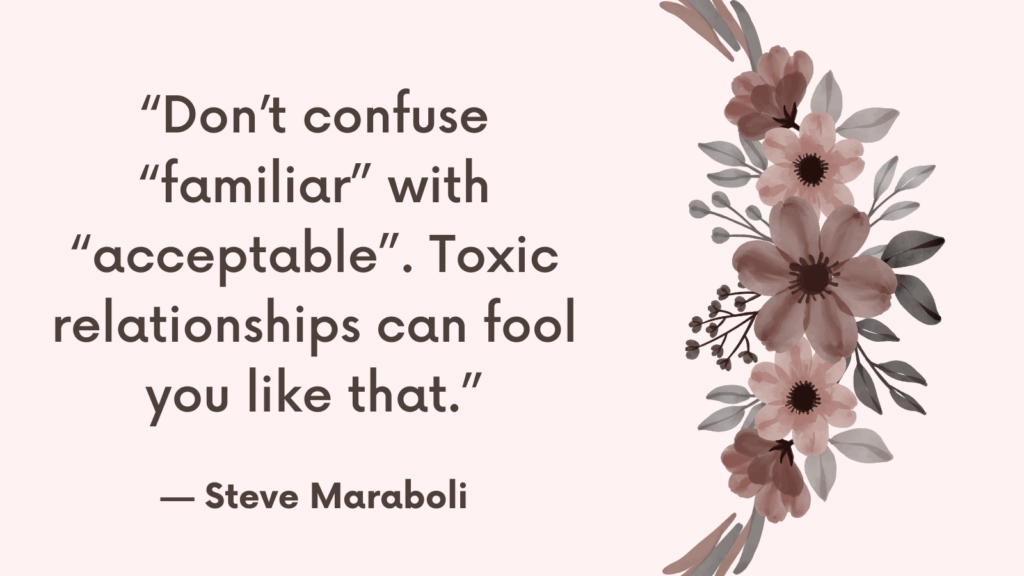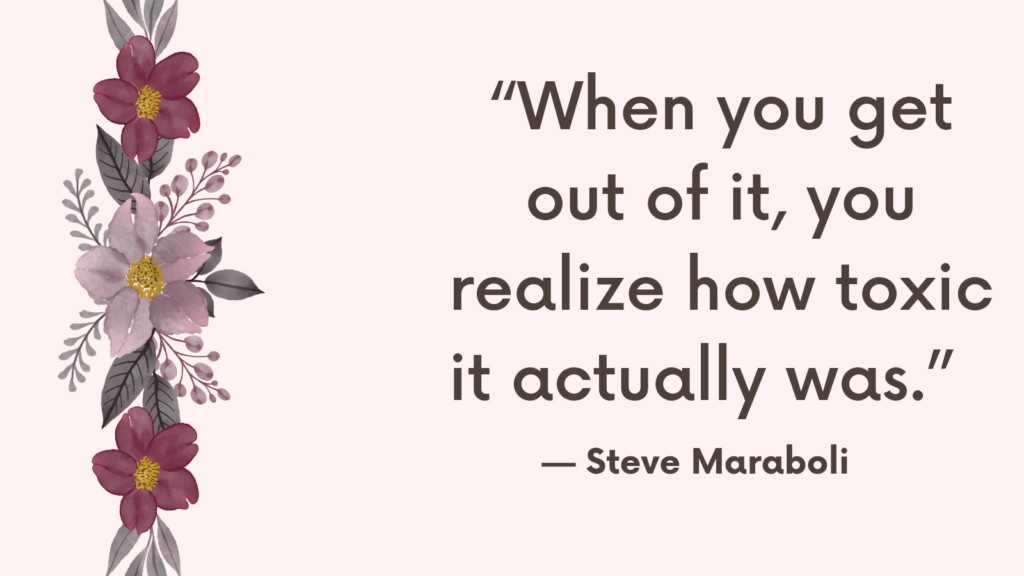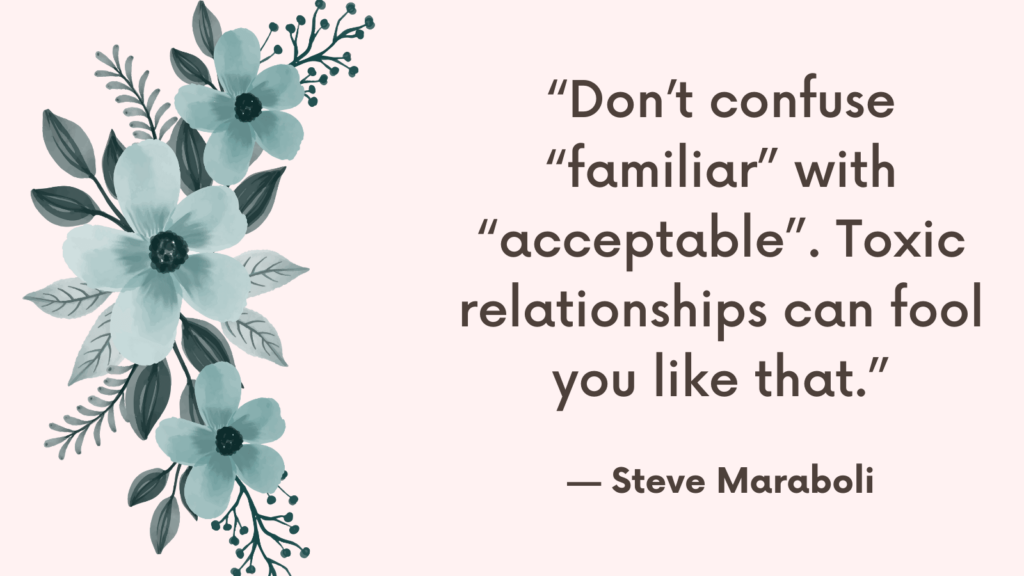This post contains signs you’re healing from a toxic relationship.
Signs You’re Healing From A Toxic Relationship
Healing from a toxic relationship is a deeply personal and often gradual process. It involves moving from a state of emotional turmoil and distress to one of self-discovery, resilience, and renewed strength.
Here are some key signs indicating that you’re healing from a toxic relationship:
1. Regained Sense of Self
You start rediscovering who you are, separate from the relationship. Your interests, passions, and desires become clearer.
2. Increased Self-Esteem
There’s a noticeable boost in your self-esteem. You feel more confident and less defined by the relationship.
3. Emotional Stability
The intense emotions associated with the relationship (anger, sadness, betrayal) start to lessen in intensity.
You find it easier to manage and regulate your emotions. Emotional lows are less devastating and easier to recover from.
4. Improved Social Connections
You begin to reconnect with friends and family from whom you might have become estranged.
You’re also able to form new, healthy relationships based on mutual respect and trust.
Related: 6 Things Happen When a Codependent Leaves a Narcissist
5. Healthy Boundaries
You become better at setting and maintaining healthy boundaries with others, including saying no when necessary.
You’re more aware of red flags in relationships and feel empowered to act on them.
6. Independence and Self-Sufficiency
You find confidence in making decisions for yourself, based on your own preferences and well-being.
You no longer seek validation or emotional support from the toxic partner or similar relationships.
7. Future Orientation
You start setting and pursuing personal goals and aspirations that are unrelated to the relationship.
There’s a renewed sense of hope and optimism for the future.
Related: Narcissistic Abuse Syndrome Quiz
8. Forgiveness and Letting Go
You learn to forgive yourself for any perceived mistakes or shortcomings during the relationship.
You may also find yourself moving towards forgiveness (when ready and if appropriate), understanding it as a step towards your own peace.
9. Self-Care and Self-Compassion
You prioritize your well-being, engaging in self-care practices regularly.
You’re kinder to yourself, acknowledging your worth and treating yourself with compassion.
10. Decreased Rumination
You spend less time dwelling on the past or the details of the relationship.
You’re more present and engaged in your current life, rather than being preoccupied with the past.
Related: How To Stop Attracting Narcissists? Top 9 Tips
11. Personal Growth
You’re able to see the growth that has come from your experience, understanding how it has shaped you into a stronger person.
You recognize your own resilience and ability to overcome adversity.
12. Joy in Solitude
You find comfort and joy in being alone, appreciating the peace and quiet to reflect and enjoy your own company.
You engage in hobbies and activities that you enjoy, without feeling the need for constant company.
Tips to Support Your Healing After a Toxic Relationship
1. Acknowledge Your Feelings
It’s essential to acknowledge the range of emotions you’re experiencing—anger, sadness, relief, confusion. All your feelings are valid.
The end of a relationship, even a toxic one, is a loss. Grieving the loss of what was or what you hoped the relationship would be is a crucial step in healing.
2. Establish Boundaries
Create physical and emotional distance between yourself and your ex-partner. This might mean limiting or ceasing contact, at least temporarily.
Consider blocking or unfriending your ex on social media to avoid unnecessary triggers.
Related: Top 10 Narcissistic Relationship Patterns
3. Seek Support
Lean on supportive friends and family members. Choose people who understand what you’re going through and can offer empathy and encouragement.
Therapists, especially those experienced in dealing with toxic relationships and their aftermath, can offer invaluable guidance and support.
4. Self-Care
Reconnect with activities and hobbies that you enjoy and find relaxing. This can be an effective way to distract yourself from negative thoughts and boost your mood.
Focus on maintaining a healthy lifestyle through proper nutrition, regular exercise, and adequate sleep. Physical well-being significantly impacts emotional health.
Related: Top 5 Self Love Exercises (+FREE Self-Love Resources)
5. Rebuild Self-Esteem
Practice self-compassion and positive affirmations. Remind yourself of your worth and that you deserve respectful, loving relationships.
Recognize and celebrate your progress, no matter how small. Healing is not linear, and acknowledging growth is crucial.
6. Reflect and Learn
Reflect on the relationship to identify any patterns or red flags you might have overlooked. This can help you understand what to avoid in future relationships.
Consider what you’ve learned about yourself from this experience. Use these insights to grow stronger and more self-aware.
7. Rediscover and Reinvent Yourself
Use this time as an opportunity to try new activities or hobbies. This can help you rediscover who you are outside of the relationship.
Setting personal and professional goals can also give you something positive to focus on and work towards.
Related: Why Self Love Isn’t Selfish (+Best 9 Ways To Grow In Self-Love)
8. Gradual Re-entry into Dating
Don’t rush into another relationship. Give yourself time to heal fully before considering dating again.
Enter the dating world with a strong sense of self-worth and clear boundaries. Knowing what you will and will not tolerate can help you avoid future toxic relationships.
9. Practice Gratitude
Make a habit of acknowledging things you are grateful for each day. This can shift your focus from what you’ve lost to what you still have and what’s to come.
10. Join a Support Group
Joining a support group, whether in person or online, can provide a sense of community and understanding.
Sharing experiences with others who have gone through similar situations can be incredibly healing.
11. Focus on the Future
Visualize the life you want to lead. Focusing on your future can help you move past the pain of the toxic relationship.
Related: How To Be Gentle With Yourself? Top 5 Ways To Practice Self-Compassion

Conclusion
Healing is not a linear process; it involves ups and downs, and progress can sometimes feel slow.
However, recognizing these signs in yourself can be affirming and motivating. It’s important to be patient and compassionate with yourself throughout this journey.



